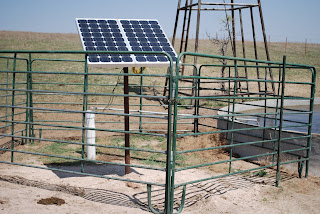 |
| Solar Powered Water Well Pump in remote pasture location. |
What does this mean in terms of pumping water with solar powered water pumps for livestock consumption? We know the sun heats the earths atmosphere so for there to be increased heat there has to be increased sunlight, and that sunlight produces the needed energy to run the solar powered water pumps. When the long hot days of summer are upon us, and the sun is beating down on the cattle the sun is also providing extended hours of pumping for the solar pumps. When water consumption is at it's highest point among the livestock the solar powered pumps are producing their greatest water output. The shorter days of winter provide less pumping from the solar pumps but that is when the cattle are drinking considerably less so the solar powered pumping system fits perfectly to the demand according to the weather conditions.
 |
| Solar Powered Well Pump for Livestock in Western KS. |
 |
| Solar well pump system installed in 1990 in Western Oklahoma. |
Even extreme winter use with solar pumps typically works well as long as freezing weather precautions are used. There must be a weep hole in the vertical pipe in the well so that it can drain below frost level when the pump shuts off at night or when extremely low light conditions occur during the day. Also it is a must that the pipe delivering the water to the tank is on such an angle that it drains completely so that water can't freeze in it and crate an ice plug. It's very important that the delivery pipe to that tank have no loops or low places in it that can hold water and freeze. The solar pumps will certainly produce less gallons per day during winter pumping hours versus summer hours but the demand from the livestock will be less as well.
This is why solar powered water pumps are a perfect fit for watering livestock. During the changing seasons as the hours of the day and the amount of water produced change, so does the demand from the animals the water is being provided for.
 |
| Advanced Power Inc. Solar Powered Water Well Pumping System |
Above a solar powered well pump system replaces a worn out windmill for producing fresh water from wells for cattle.
Watch a video about our systems and how easy they are to install.
Follow us on Facebook
If you enjoyed our article won't you please consider sharing it on facebook and twitter and help spread the word about our quality solar water pumps.
No comments:
Post a Comment